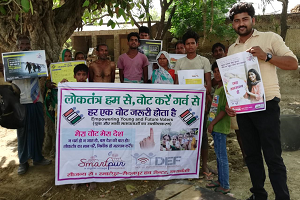 As part of their innovative initiative, Atul and Madhuri, from DEF’s Smartpur centre at Hosadoddi, Kollegal region of Karanataka, organised nutrition workshop where the community children took pledge to clean their vicinities before and after eating and follow basic personal hygiene principles. The programme took place on May 1 where the children were also engaged in small activities as washing, cutting and cooking food for the day. Smartpur has been strengthening its efforts by organising workshops and actively creating awareness amongst communities under its six pillars- health, education, livelihood, governance, finance and entertainment.
As part of their innovative initiative, Atul and Madhuri, from DEF’s Smartpur centre at Hosadoddi, Kollegal region of Karanataka, organised nutrition workshop where the community children took pledge to clean their vicinities before and after eating and follow basic personal hygiene principles. The programme took place on May 1 where the children were also engaged in small activities as washing, cutting and cooking food for the day. Smartpur has been strengthening its efforts by organising workshops and actively creating awareness amongst communities under its six pillars- health, education, livelihood, governance, finance and entertainment.
Meanwhile in Kishanpura of Bharatpur, Rajasthan, on May 9 a one day health camp was organised. Despite the heat and celebrations of Ramzan, two general physicians from the district level Municipal Hospital attended 59 villagers who visited the Smartpur centre for free check-up and medicines. Most of the cases reported were related to respiratory problems and other allergies. The camp was coordinated by Panchayat members along with Smartpur entrepreneurs. Similarly, on May 21 a team of doctors visited Ladamka village centre in Rajasthan for organising a free health camp.
Tain village in Nuh, Haryana, is taking lead under the health pillar. The village is first of its kind out of all the 100 Smartpur villages to install a sanitary napkin vending machine for the women of the village. This was established on May 11 with the help of a lady HealthPreneur available at the centre. There was a huge support for this idea when it was discussed with the villagers which led to the successful installation of the same. On May 20, an immunisation camp was organised that saw a greater participation from women and the children.
Meanwhile, under the governance pillar, voter awareness campaigns were carried out throughout the month across various Smartpur centres, in line with the phases of 17th Lok Sabha elections. On May 1 Barabanki organised brief discussions on need for elections and the importance of casting vote. During the various village level drives people were informed about voting process. Simultaneously these drives also became opportunity to mobilise the communities towards Smartpur, DCDP and SoochnaPreneur – the project based initiatives that DEF is undertaking in the region. The participants of such gatherings were the dyer community members who dye yarn and cloths, farmer groups, weavers and their families.
On May 28, a drawing competition was organised across seven states, 10 districts and 100 villages to celebrate the International Menstrual Hygiene Day. Young girls expressed their creativity on fabric, which was then stitched together and placed at various resource centres.








